- Psychological Warfare in Chinglish
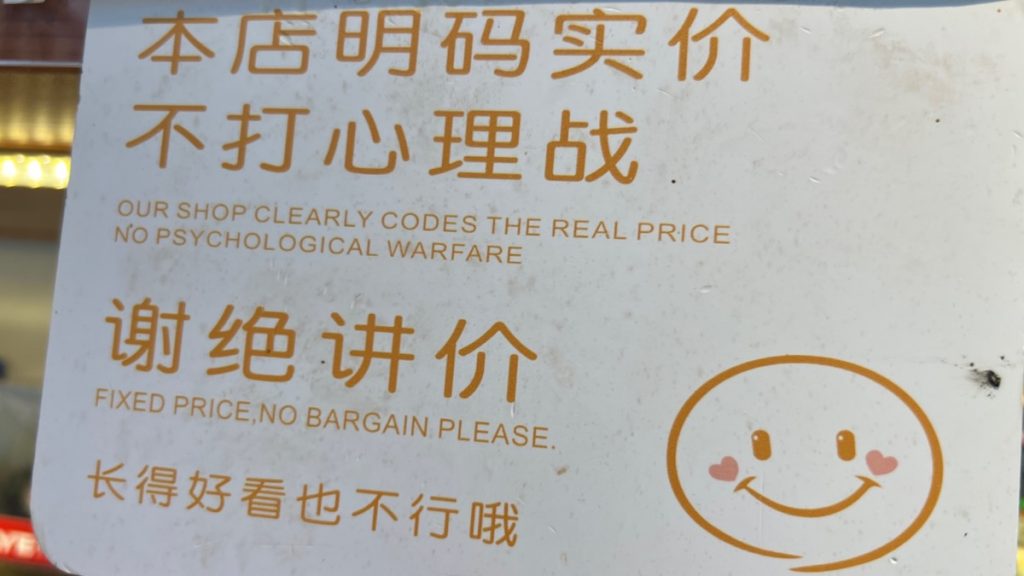
At a time when US-China relationships are pretty much in the toilet, the worst that can happen is — psychological warfare in Chinglish, apparently…
The fact that the shop also “codes” the real price makes this appear a bit more like a Chinglish national security operation… except for in place of big tanks, you get big signs — full of iffy, linguistical gibberish.
The sign, of course, wanted to make it clear in Chinese that what you see is what you get — price-wise — and it’s the real deal. It’s not funning with your perception of price, as it has nothing to hide. The Chinese “心理战” bit, I guess, may work in vernacular slang — in saying it’s being honest.
Of course, in English, the translation of this as “psychological warfare” is hilarious-bordering-on-nefarious. Things are made easier with the statement below — “Fixed price, no bargain please” — but this quip on “psychological warfare” still appears pretty sinister.
To defuse this bit of awkward Chinglish, consider replacing that with “This is the real deal” or “No hidden surcharges” (or extras) — unless, of course, you enjoy tormenting (would-be) customers with the threat of pricing psyops!…
Kaifeng, He’nan (Central China), 11 August 2025
- Confusing Chinglish from “Tanzili” (?) in Weichang
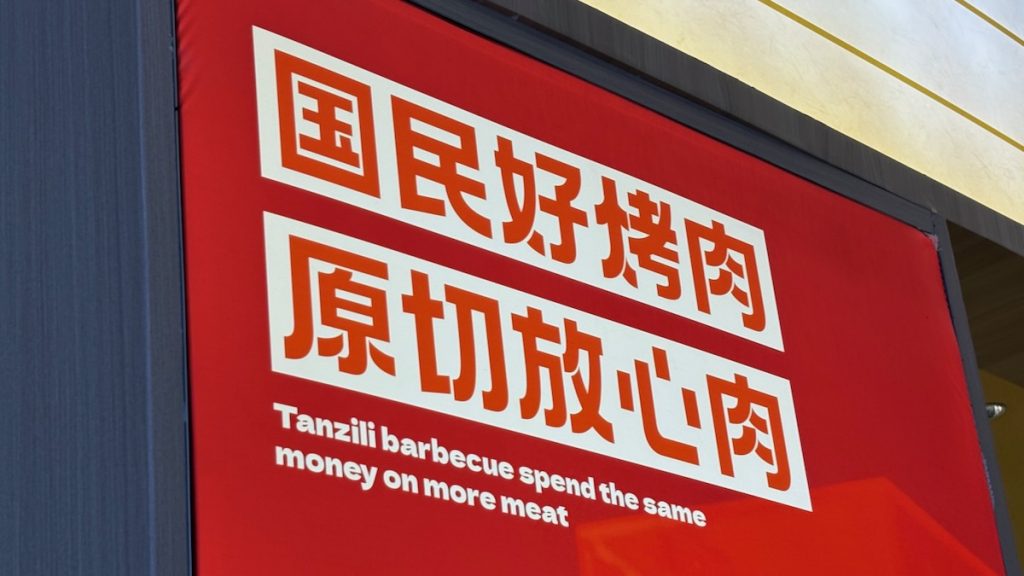
This past October Break, the extra day off meant yours truly managed to visit Weichang Manchu and Mongol Autonomous County (围场满族蒙古族自治区) in the northernmost extremes of Hebei. Amazingly, they have a Starbucks (which in China, shows to the local authorities “you have money” or “you are global” — supposedly). But they were also not short on Chinglish.
This very restaurant billboard featuring “Tanzili” (which is confusing in itself) perplexes many, because it seems like the English translation basically bears little resemblance to its original text in English. Notably, Googling Tanzili pops up some Tanzanian government authority as the first search result!…
In China, something that is branded as “nationals” (as in people; 国民) is seen as a “good norm for people”, something other enterprises should strive to be. This, then, is for a restaurant offering barbecued meat. Anyone with a basic understanding of both languages should know how “off” the very poor translation was.
Given, then, that the whole translation is basically wasted as it is, here is the correct translation for this restaurant:
Quality Barbecued Meat Loved by Customers
The Original, Safe and SatisfyingWe have absolutely no idea how Tanzili came to be part of this ad — and the Chinese makes no mention on pricing (“spend the same money on more meat”). The English — Chinglish, rather — can go. Let’s replace it with proper English!
Weichang, Hebei (Northern China), 05 October 2025
- New Supermarket… New Chinglish?
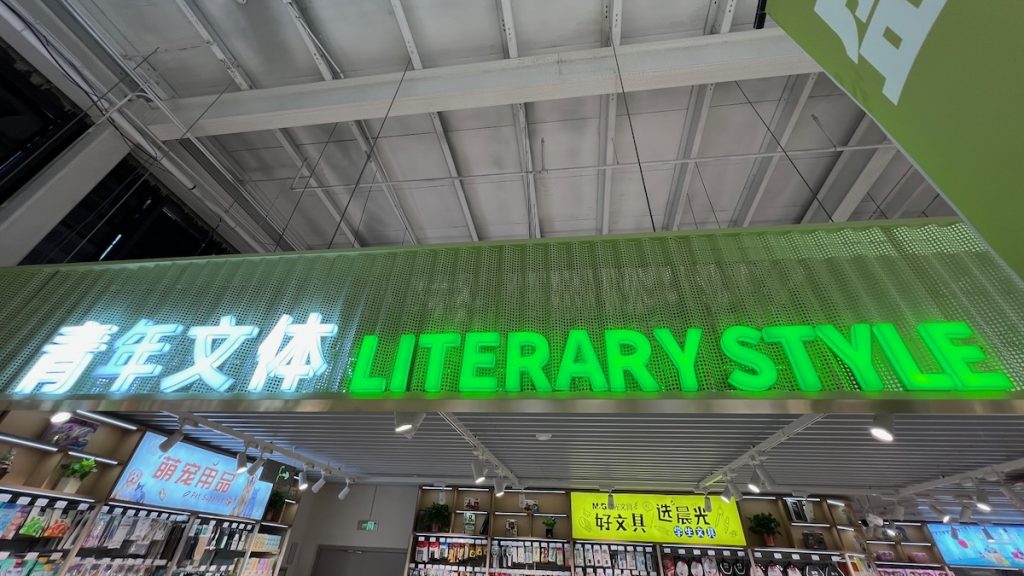
Just picking up at the end of a long October Break 2025 in China — lots of travelling, and a fair bit of Chinglish, too. My wife, always on the hunt for a good deal, spotted a new supermarket offering special deals.
And, might I say, quite a lot of Chinglish as well. Here are three of my favourites…
“Literary Style” (青年文体)
Probably one of the most amazing mistranslations, as you’ve seen as the “main pic” above. In fact, this is supposed to be where “trendy” gear for the younger generation are sold, as well as “cultural” and “sports” items. Normally, “Youth / Culture / Sports” is what would be expected as a more proper translation.
“Block Market” (街区集市)
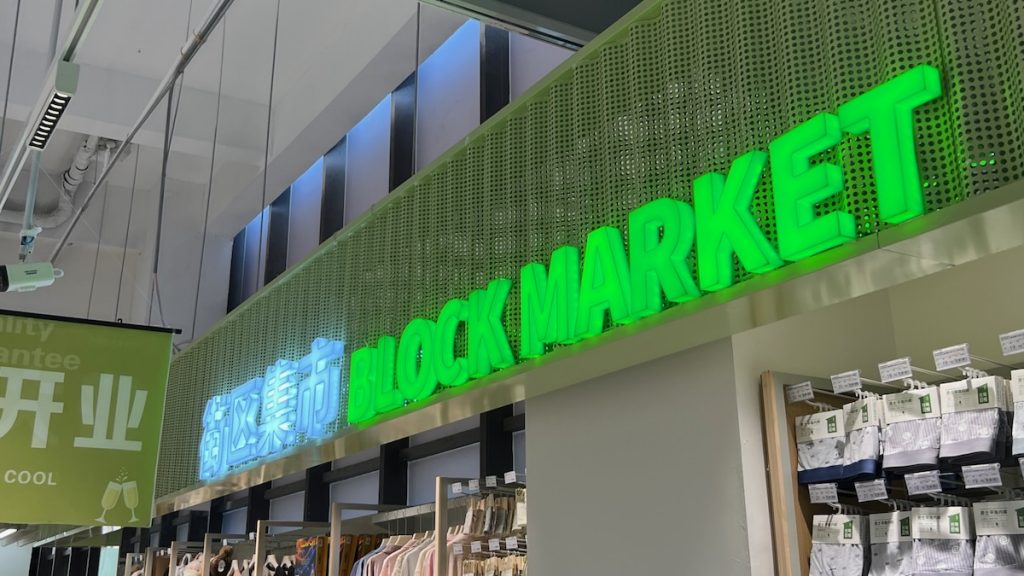
This one is a bit more complex. Apparently, this is supposed to be trendy apparel you see sold in street markets, or somewhere similar. Wouldn’t, say, “trendy streetwear”, “trendy fashion”, or something similar, work as well?
“Fruit Crusher” (美味果坚)
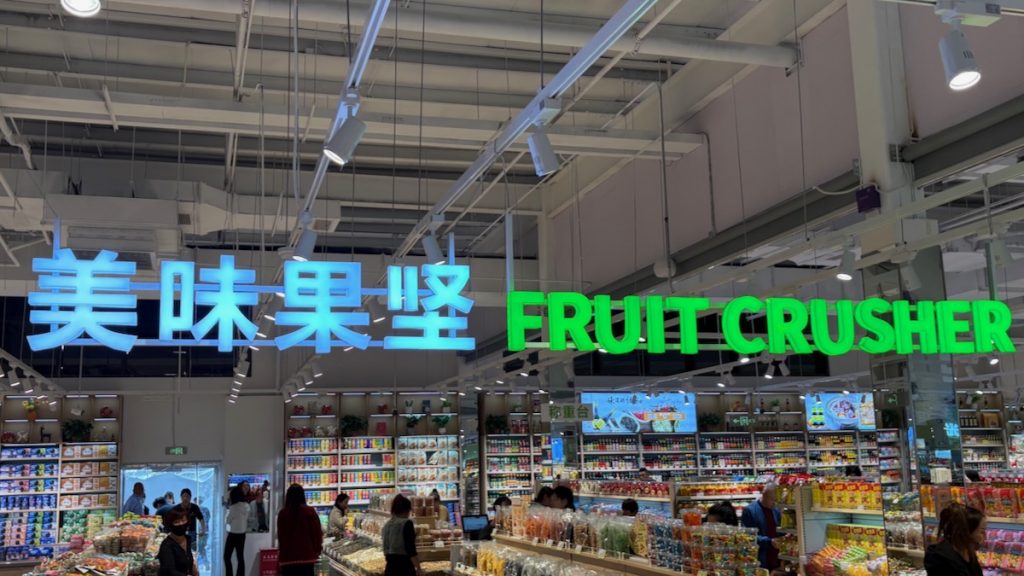
Probably my favourite — fav of them all, this sounds pretty brutal, in fact — funny, but also brutal. Cashew, nuts, and the like — it sounds less dramatic “fruit crusher” brings out — maybe — sounds of cashew nuts being crushed — a pretty brutal noise! — but it’s also much easier to understand.
In fact, these are just a minority of signs I’ve seen at this newly-opened supermarket in Chengde, Hebei, northern China. Incredibly, the vast majority of signs are without any serious traces of Chinglish — although typos (pretty much unintended) were found (“Gsrlic paste” when it was obvious they wanted to write Garlic paste).
Chinese supermarkets have for sure come quite a long away from in-your-face Chinglish (“Fuck the certain price of goods” remains an epic classic, as well as previously-ubiquitous “Fuck goods” for Dry goods), and it’s good to see — even if we haven’t reached Swiss levels of perfection yet — that they’re taking this seriously.
By the way, Switzerland is not Chinglish-free, or rather Swinglish-free, either!
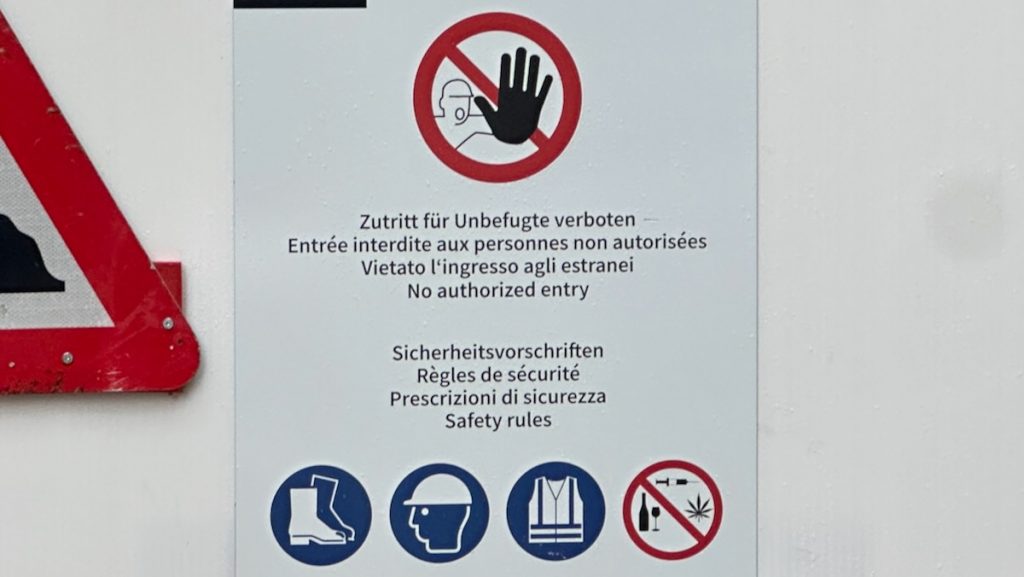
Yes, so English-language speakers may continue, but all using local languages must stop? Goes to prove that no matter how perfect we associate somewhere or someplace, there’s always this or that bit of imperfection left…!
Chinglish signs from Chengde, Hebei (Northern China), 03 October 2025; Swiss sign from Zürich, Switzerland, July 2025
- Motivational Chinglish — Better Treat Life “Serious”!
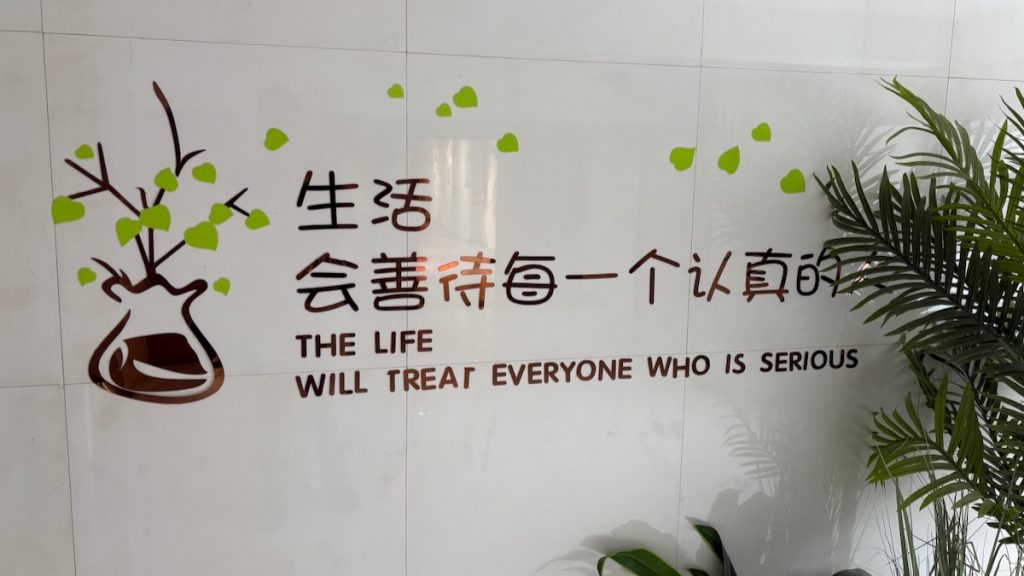
The pleasures of remote working — which I’ve done for almost 20 years — is that you get to choose where you work. (With data tethering, wifi is optional, even!) And my end — this almost like you’re on the search, at the same time — for fresh new Chinglish every day.
So this bit of motivation — “The life will treat everyone who is serious” (生活会善待每一个认真的人) — is supposed to, at least in the Chinese text, tell people that — if you’re serious and careful in what you do in life, good things will happen. (In other words, don’t rush through stuff and churn out half-baked products!)
Except for, of course, the Chinglish tells something different. The “serious” bit alone stands out to indicate that, maybe, a stiff upper lip is mandatory. (Likely, although to win, it’s also OK to smile!)
Worst thing about this mistranslation? “Good things will happen” (roughly the 善待 bit in Chinese) remains un-translated! So even if you’re serious about things, you’re not told good things will happen — much as the word “treat” could possibly semi-infer, it’s not taken for granted; “treat” can also, as per the dictionary, mean “behave towards or deal with in a certain way” — and there’s no clear indication it could be positive!
So yes, this motivational message is actually read in two ways by two groups. For native Chinese speakers, it’s an uplifting message — work hard, and reap the rewards. For “internationals” in English, it’s more a stern CBP officer-like message: “the life will treat everyone who is serious” — thing of course, how will they be treated?
Better to translate it — and simplify it — with this: Life is fair! Work hard, and reap the rewards!
Central Zhengzhou, He’nan (Central China) 27 August 2025
- Welcome the Respectful Guests to Guide the Work
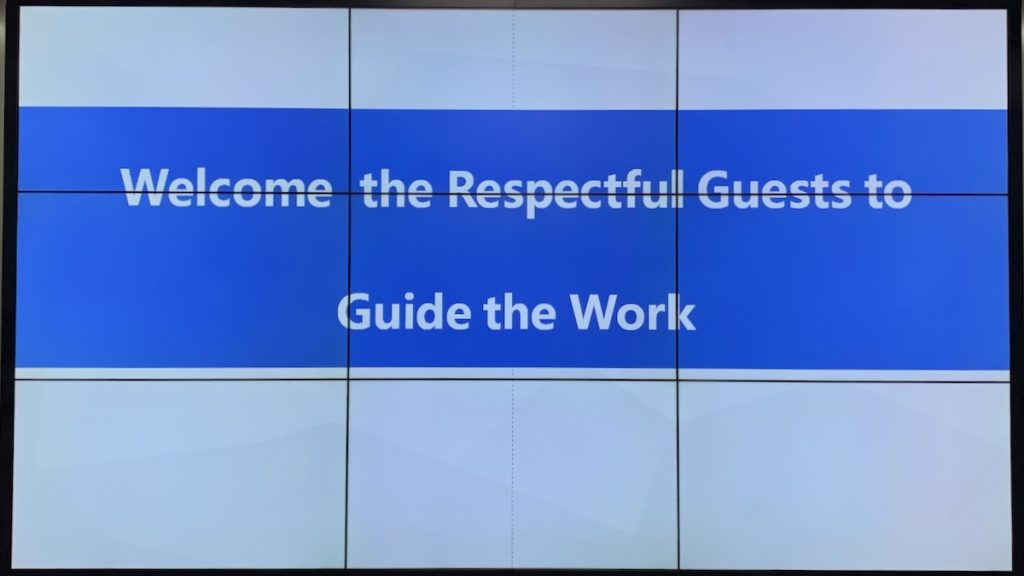
To the agony of some in City Hall in the capital, China is increasingly becoming a superpower. (The fact I mentioned this public statement of fact got me cancelled from a Chinglish-related presentation I was about to do for them last autumn — typical bureaucratic paranoia! Oh and the “agony” part is because some prefer to be… low-key?)
But China loves to show off — not in a pretentious way, though — but in fact-based way. So just before Covid, I got invited to Shandong, eastern China, for a look at industry “in action”. That great big Chinglishy display was for all of us expats to see… as we arrived…
Well, to you, fellow respectful guests browsing The Chinglish Blog — a blog I don’t for an attosecond regret doing, no matter what it might entail — I do welcome you all to guide the work. We can start with a browse through what this site will in future be about.
Exposing Chinglish. The number one reason why this site exists. The raison d’être for the microphone with the enormous thick foam cover on the site, so to speak. The blog will unabashedly expose some serious WTF-level Chinglish (and those not as scary). But far from laughing out loud, we’ll go in-depth and see why the sign ended up this way.
A Chinglish Visit of Cities. Taking a look at three things in every Chinese city, big and small, wayside county town and superpower megalopolis alike, we take a look at three things that define a city: the way streets are named and translated, the way metro stations are named (or tram stops; if none, then bus stops) and hence translated, and the “English ecosystem” in key parts of town (like the city centre, but also the hi-tech hub in the suburbs).
Places Doing it Right. This blog will also, notably, be interested in signage which appears pretty much picture-perfect. It’ll show which places take great care to present warnings and advisory in as un-Chinglishy a way as possible. And more.
The Chinglish Blog is a David Feng blog. Therefore, updates will follow on David’s own Instagram and Twitter (“X”) account; YouTube clips, too, are in the pipeline.
Updates will start, first of all, over the weekend, then slowly spread to Wednesday, Monday, and Friday, in that order.
Enjoy!
PS: A better translation for the above Chinglish? A simple Welcome to [Company Name], along with an option mention of where the delegation is from, will work. Hence, it should be: Welcome to Acme Microphone Company to guests from the UK, or something similar…
